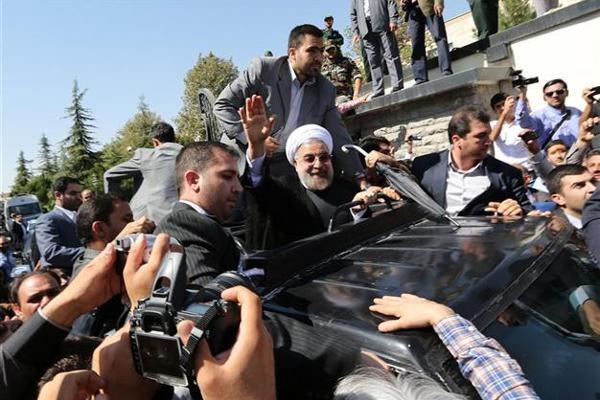Obama, Rouhani call stirs cheer, protests
TEHRAN


Iranian president Hassan Rouhani waves to supporters as his motorcade leaves Tehran's Mehrabad Airport upon his arrival from New York, on September 28, 2013. AFP PHOTO/ATTA KENARE
Iran has sought to calm hardline worries over groundbreaking exchanges with Washington, saying a single phone conversation between the American and Iran presidents is not a sign that relations with will be quickly restored.The move came a day after hundreds of Iranians cheered President Hassan Rouhani on his return from New York as a smaller number of hardliners threw eggs and shoes at his official car leaving the airport.
The comments by Deputy Foreign Minister Abbas Araghchi appeared tailored to address Iranian factions, including the powerful Revolutionary Guard, which have grown uneasy over fast-paced outreach last week between the White House and Rouhani, which was capped by a 15-minute call with President Barack Obama.
“Definitely, a history of high tensions between Tehran and Washington will not go back to normal relations due to a phone call, meeting or negotiation,” Araghchi was quoted by the Fars news agency as saying.
Rouhani is looking to restart stalled talks over its nuclear program in the hopes of easing U.S.-led sanctions. Iran, however, has not clarified what concessions it is willing to make with its nuclear program in exchange.
Araghchi also reiterated statements by Iranian Supreme Leader Ayatollah Ali Khamanei, who said he no longer opposes direct talks with Washington but is not optimistic about the potential outcome. Khamanei appears to have given Rouhani authority to handle the nuclear talks with world powers, scheduled to resume in Geneva in two weeks, and seek possible broader contacts with the Obama administration.
“We never trust America 100 percent,” said Araghchi. “And, in the future, we will remain on the same path. We will never trust them 100 percent.”
The divisions over Rouhani’s overtures were on display on Sept. 28 when he returned from New York. Supporters welcomed him with cheers, but a smaller pocket of protesters shouted insults.
The U.S. and Iran broke ties after the 1979 Islamic Revolution when mobs stormed the U.S. Embassy in Tehran. A total of 52 hostages were held for 444 days. Hardline lawmaker Hamid Rasaei criticized the phone call as “breaking the resistance brand” of Iran.
Another conservative lawmaker, Alaeddin Boroujerdi, head of the influential parliamentary committee, interpreted the phone call in a positive way as Rouhani trying to help the “failing reputation” of Obama.
But Iranian media said hundreds of Rouhani supporters keen to see him make good on pledges of “constructive interaction” with the world to ease Iran’s international isolation and win relief from punitive sanctions turned up to hail his U.N. visit.
They greeted the president with chants of “Rouhani, we thank you” and “Iran calls for moderation” and held aloft portraits of him, the student news agency ISNA said.
But about 100 conservative hardliners also appeared, shouting “Death to America,” a standard refrain at radical rallies in Iran since the 1979 Revolution, and “no compromise or surrender to our national interests.”
Witness reports posted on Twitter said protesters pelted Rouhani’s limousine with eggs and stones in anger over his direct contact with Obama.
